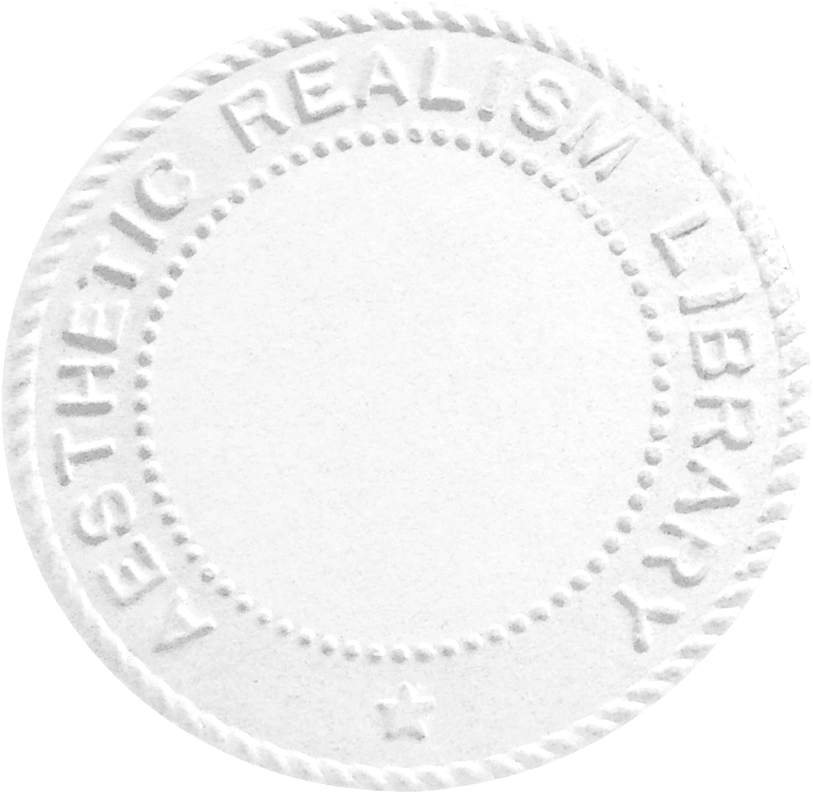From The Critical Muse: Imperative Aesthetic Realism Illustrations
© 1974 by Aesthetic Realism Foundation
From Goody Blake and Harry Gill
Now, when the frost was past enduring,
And made her poor old bones to ache,
Could anything be more alluring
Than an old hedge to Goody Blake?
And, now and then, it must be said,
When her old bones were cold and chill,
She left her fire, or left her bed,
To seek the hedge of Harry Gill.
Now Harry he had long suspected
This trespass of old Goody Blake,
And vowed that she should be detected,
And he on her would vengeance take.
And oft from his warm fire he’d go,
And to the fields his road would take
And there, at night, in frost and snow,
He watch’d to seize old Goody Blake.
And once, behind a rick of barley,
Thus looking out did Harry stand:
The moon was full and shining clearly,
And crisp with frost the stubble land.
He hears a noise—he’s all awake—
Again!—on tip-toe down the hill
He softly creeps—’Tis Goody Blake,
She’s at the hedge of Harry Gill.
Right glad was he when he beheld her:
Stick after stick did Goody pull:
He stood behind a bush of elder,
Till she had filled her apron full.
When with her load she turned about,
The by-way back again to take;
He started forward with a shout,
And sprang upon poor Goody Blake.
And fiercely by the arm he took her,
And by the arm he held her fast,
And fiercely by the arm he shook her,
And cried, “I’ve caught you, then, at last!”
Then Goody, who had nothing said,
Her bundle from her lap let fall;
And, kneeling on the sticks, she prayed
To God that is the judge of all.
She prayed, her withered hand uprearing,
While Harry held her by the arm—
“God! who art never out of hearing,
Oh, may he never more be warm!”
The cold, cold moon above her head,
Thus on her knees did Goody pray,
Young Harry heard what she had said:
And icy cold he turned away.
He went complaining all the morrow
That he was cold and very chill:
His face was gloom, his heart was sorrow;
Alas! that day for Harry Gill!
That day he wore a riding-coat,
But not a whit the warmer he:
Another was on Thursday brought,
And ere the Sabbath he had three.
‘Twas all in vain, a useless matter—
And blankets were about him pinned;
Yet still his jaws and teeth they clatter,
Like a loose casement in the wind.
And Harry’s flesh it fell away;
And all who see him say, ’tis plain,
That, live as long as live he may,
He never will be warm again.
No word to any man he utters,
A-bed or up, to young or old;
But ever to himself he mutters,
“Poor Harry Gill is very cold.”
A-bed or up, by night or day;
His teeth they chatter, chatter still.
Now think, ye farmers all, I pray,
Of Goody Blake and Harry Gill.
—William Wordsworth
The Complete Poetical Works of William Wordsworth,
(Boston: Houghton Mifflin Company, 1904), pp. 77-79.



Comment by Eli Siegel on Wordsworth’s
“Goody Blake and Harry Gill”
“Goody Blake and Harry Gill” is a jolly psychosomatic poem, with the lines having simplicity, motion, and the Wordsworthian musical and visual cunning of vowel and consonant, syllable and word. And the poem is so ethical. Evil is conquered by hidden physiological powers. He who does not wish others to be warm, becomes cold himself, cold beyond redemption by overcoats. Whether the poem happened or not—Wordsworth found the incident in a note by the scientifically learned writer of verse Erasmus Darwin—deeply the poem is with truth. For we are not warm unless we are for warmth as a thing of the universe, diversely appearing, affecting, permeating. How dare we be warm, the poem says, unless we honor the principle of warmth wherever it seeks to be. It is just like wanting to be sensible without wanting to honor good sense wherever it may happen. So whether “Goody Blake and Harry Gill” has the psychological facts with it or doesn’t, it says something current and true of the unconscious of man.